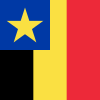Eugène Jungers
Eugène Jungers (1888–1958) was a Belgian colonial civil servant and lawyer. Beginning his career in the Belgian Congo as a colonial magistrate, Jungers rose rapidly through the judiciary and became the colonial governor of the League of Nations Mandate of Ruanda-Urundi from 1932 to 1946. In 1946, Jungers was further promoted to Governor-General of the Belgian Congo, the senior administrative position in the colony, which he held from 1946 to 1952.
Eugène Jungers | |
|---|---|
| Governor-General of the Belgian Congo | |
| In office 31 December 1946 – 1 January 1952 | |
| Monarch | Leopold III (1946–51) Baudouin (1951–52) |
| Preceded by | Pierre Ryckmans |
| Succeeded by | Léon Pétillon |
| Vice Governor-General Governor of Ruanda-Urundi | |
| In office 18 August 1932 – 5 July 1946 | |
| Monarch | Albert I (1932–34) Leopold III (1934–46) |
| Governor General | Auguste Tilkens Pierre Ryckmans |
| Preceded by | Charles Voisin |
| Succeeded by | Maurice Simon |
| Personal details | |
| Born | Eugène Jacques Pierre Louis Jungers 19 July 1888 Messancy, Belgium |
| Died | 17 September 1958 (aged 70) Brussels, Belgium |
Early life
Jungers was born in Messancy, a small Belgian town on the border with Luxembourg, on 19 July 1888 to a family of Luxembourgish ancestry. He studied at the University of Liège, graduating with a doctorate in Law in 1910.[1]
Joining the Belgian colonial service, Jungers arrived in the Belgian Congo in 1911 where he took up a position as junior magistrate.[1] Posted around the colony, he quickly rose through the ranks of the colonial judiciary.[1] In 1924, he was made resident of Ruanda. In 1932, he was promoted to the rank of Vice Governor-General and was given responsibility for the Belgian League of Nations mandate of Ruanda-Urundi (modern-day Rwanda and Burundi), replacing Charles Voisin.[1] He held the position until 1946; a tenure which included World War II and the Ruzagayura famine of 1943–44.[1]
In 1946, Jungers was promoted as the replacement for Pierre Ryckmans as Governor-General of the Belgian Congo, the most important administrative position in the colony.[1] He held the position until 1952 after which he took a board position at the Office des transports coloniaux (OTRACO).[1] He received a noble title in 1956 and died in Brussels in 1958.[1]
References
Bibliography
"JUNGERS (Eugène)". Biographie Belge d'Outre-Mer. 6. Brussels: Académie Royale des Sciences d'Outre-Mer. 1968. col. 562-66.
